Yemanja Goddess of Sea and the New Year’s Celebrations
As the 2017 was coming to an end hundreds of practitioners of Brazil’s Afro-Brazilian Candomble and Umbanda faiths have gathered at Rio de Janeiro’s Copacabana beach to honor the sea goddess Yemanja in a traditional New Year tribute asking for good luck and prosperity in the next year.
Worshippers were mostly dressed in white as they launched their offerings to Yemanja: small boats with flowers and bowls with candles and fruits. Night-long music and dancing follow the offerings.
Couple days after, for the arriving of 2018, the main New Year’s party was celebrated with fireworks erupting on Copacabana beach after the clock struck midnight to usher in the new year. When, around 2 million people, gathered to wish all the good for their lives.
Candomble was brought to Brazil by West African slaves at the beginning of the 19th centuries. Umbanda is an Afro-Brazilian religion that blends African traditions with Roman Catholicism and indigenous American beliefs.
Read more:
Brazilians honor sea goddess in Rio de Janeiro.
AP PHOTOS: New Year’s Eve observances around the world
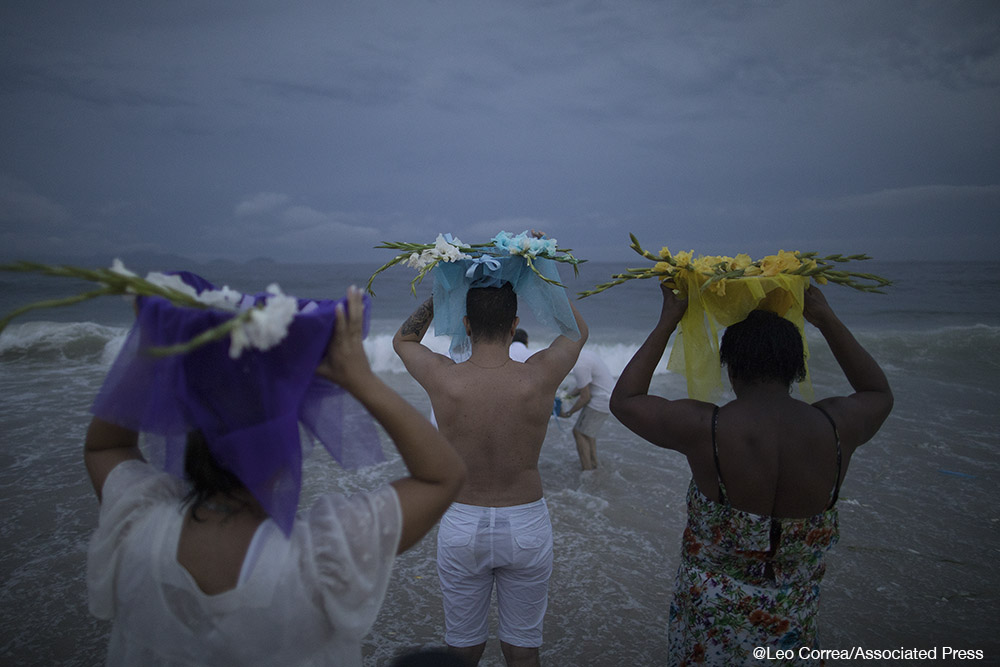
Faithfuls carry offerings for Yemanja, goddess of the sea, during a ceremony that is part of traditional New Year's celebrations on Copacabana beach in Rio de Janeiro, Brazil, Friday, Dec. 29, 2017. Hundreds of practitioners of Brazil's Afro-Brazilian Candomble and Umbanda faiths have gathered at Rio de Janeiro's Copacabana beach to honor Yemanja. Worshippers were mostly dressed in white as they launched their offerings to Iemanja: small boats with flowers and bowls with candles and fruits. (AP Photo/Leo Correa)

A faithful gestures after carrying a boat into the water filled with offerings for Yemanja, goddess of the sea, during a ceremony that is part of traditional New Year's celebrations on Copacabana beach in Rio de Janeiro, Brazil, Friday, Dec. 29, 2017. As the year winds down, Brazilian worshippers of Yemanja celebrate the deity, offering flowers and launching large and small boats into the ocean in exchange for blessings in the coming year. The belief in the goddess comes from the African Yoruban religion brought to America by West African slaves.(AP Photo/Leo Correa)
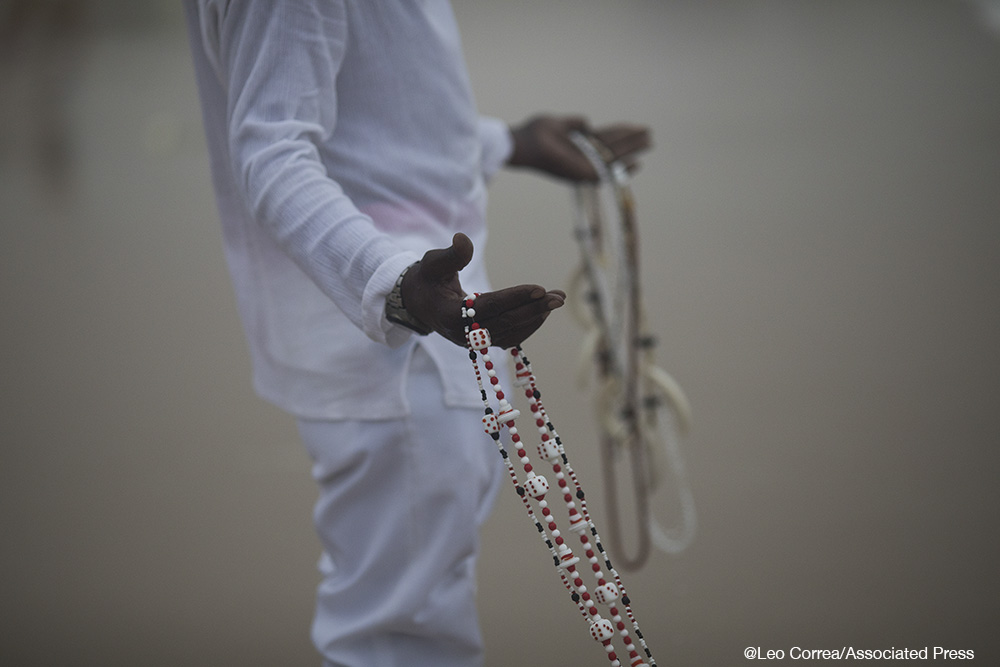
A man prays as he holds necklaces, as symbols of protection, during a ceremony for Yemanja, goddess of the sea, that is part of traditional New Year's celebrations on Copacabana beach in Rio de Janeiro, Brazil, Friday, Dec. 29, 2017. As the year winds down, Brazilian worshippers of Yemanja celebrate the deity, offering flowers and launching large and small boats into the ocean in exchange for blessings in the coming year. The belief in the goddess comes from the African Yoruban religion brought to America by West African slaves.(AP Photo/Leo Correa)

A woman in a trance hugs a faithful during a ceremony for Yemanja, goddess of the sea, that is part of traditional New Year's celebrations on Copacabana beach in Rio de Janeiro, Brazil, Friday, Dec. 29, 2017. As the year winds down, Brazilian worshippers of Yemanja celebrate the deity, offering flowers and launching large and small boats into the ocean in exchange for blessings in the coming year. The belief in the goddess comes from the African Yoruban religion brought to America by West African slaves.(AP Photo/Leo Correa)
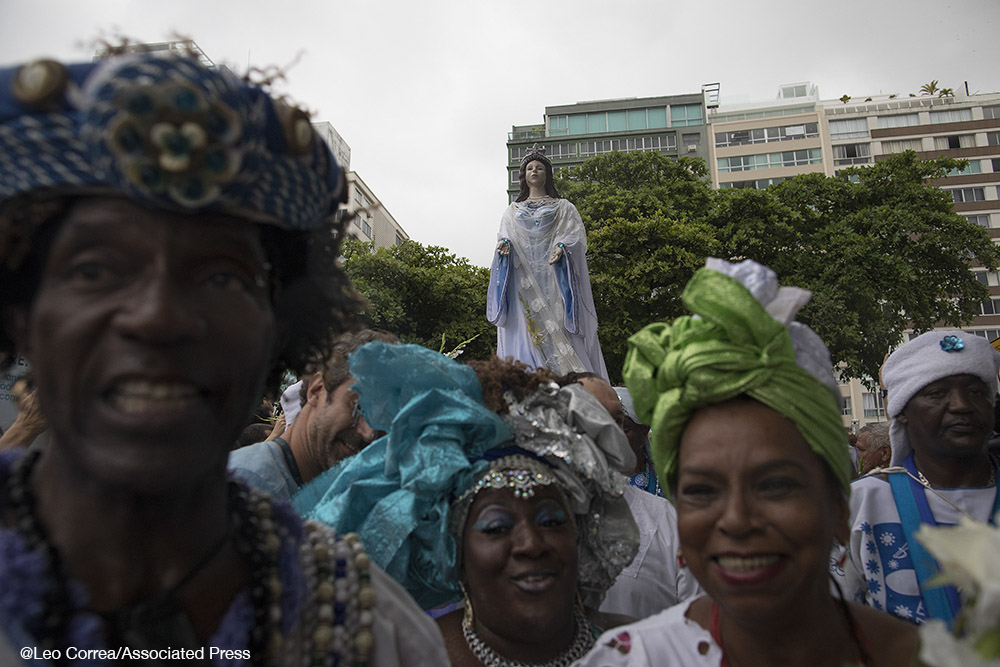
People sing as they march with the statue of Yemanja, goddess of the sea, that is part of traditional New Year's celebrations on Copacabana beach in Rio de Janeiro, Brazil, Friday, Dec. 29, 2017. As the year winds down, Brazilian worshippers of Yemanja celebrate the deity, offering flowers and launching large and small boats into the ocean in exchange for blessings in the coming year. The belief in the goddess comes from the African Yoruban religion brought to America by West African slaves.(AP Photo/Leo Correa)
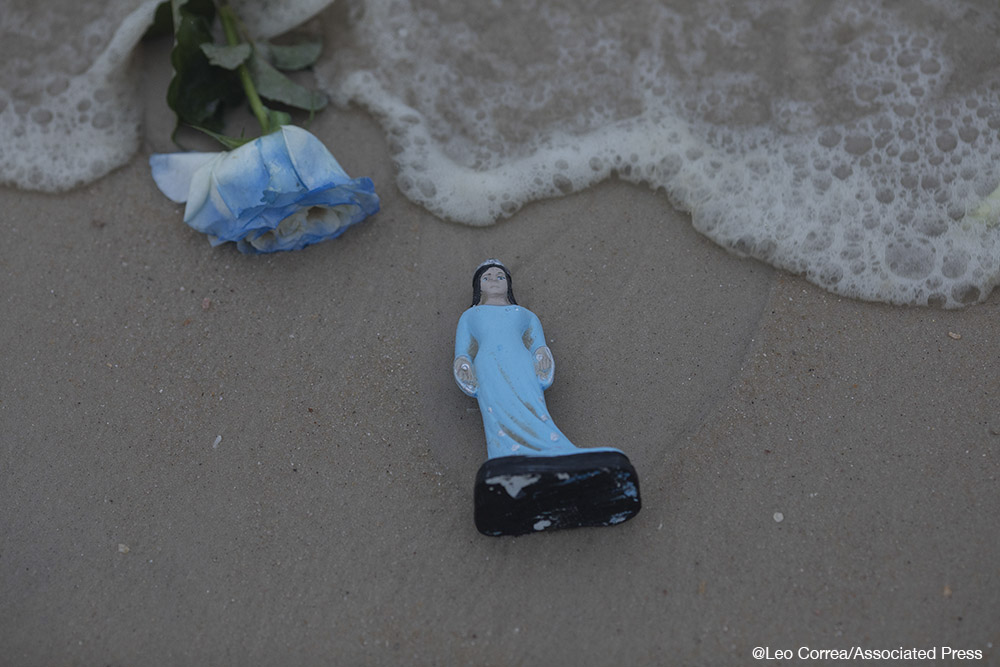
A small statue of Yemanja, goddess of the sea, is seen on the sand during a ceremony that is part of traditional New Year's celebrations on Copacabana beach in Rio de Janeiro, Brazil, Friday, Dec. 29, 2017. As the year winds down, Brazilian worshippers of Yemanja celebrate the deity, offering flowers and launching large and small boats into the ocean in exchange for blessings in the coming year. The belief in the goddess comes from the African Yoruban religion brought to America by West African slaves.(AP Photo/Leo Correa)
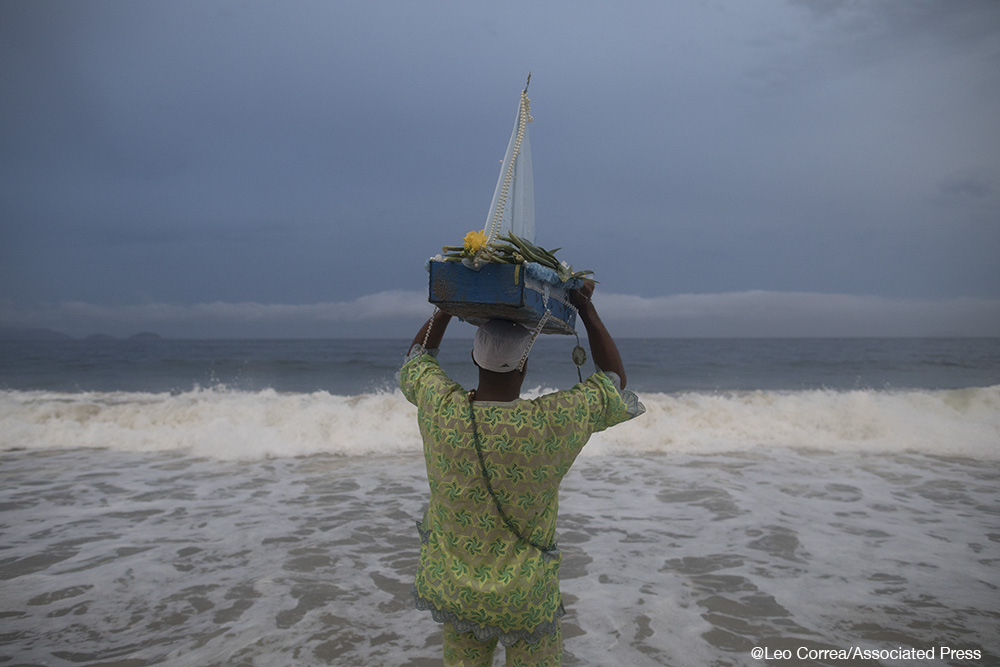
A faithful carries a small-scaled boat filled with offerings for Yemanja, goddess of the sea, during a ceremony that is part of traditional New Year's celebrations on Copacabana beach, in Rio de Janeiro, Brazil, Friday, Dec. 29, 2017. As the year winds down, Brazilian worshippers of Yemanja celebrate the deity, offering flowers and launching large and small boats into the ocean in exchange for blessings in the coming year. The belief in the goddess comes from the African Yoruban religion brought to America by West African slaves.(AP Photo/Leo Correa)

A faithful carries flowers as an offering for Yemanja, goddess of the sea, during a ceremony that is part of traditional New Year's celebrations on Copacabana beach in Rio de Janeiro, Brazil, Friday, Dec. 29, 2017. As the year winds down, Brazilian worshippers of Yemanja celebrate the deity, offering flowers and launching large and small boats into the ocean in exchange for blessings in the coming year. The belief in the goddess comes from the African Yoruban religion brought to America by West African slaves.(AP Photo/Leo Correa)
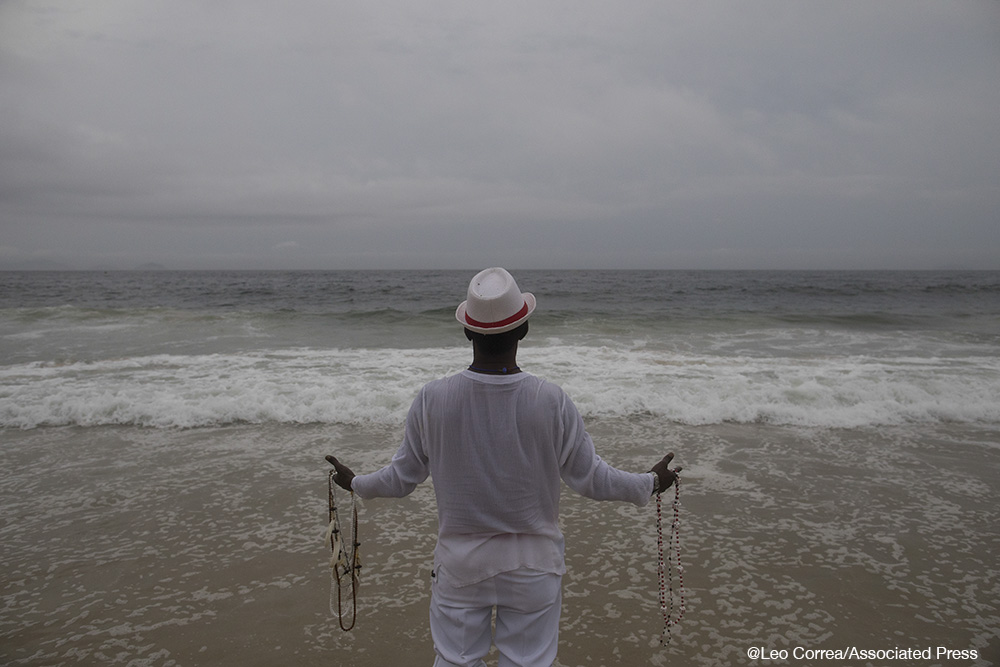
A man prays as he holds necklaces, as symbols of protection, during a ceremony for Yemanja, goddess of the sea, that is part of traditional New Year's celebrations on Copacabana beach in Rio de Janeiro, Brazil, Friday, Dec. 29, 2017. As the year winds down, Brazilian worshippers of Yemanja celebrate the deity, offering flowers and launching large and small boats into the ocean in exchange for blessings in the coming year. The belief in the goddess comes from the African Yoruban religion brought to America by West African slaves.(AP Photo/Leo Correa)

A faithful carries a boat filled with offerings for Yemanja, goddess of the sea, during a ceremony that is part of traditional New Year's celebrations on Copacabana beach, in Rio de Janeiro, Brazil, Friday, Dec. 29, 2017. As the year winds down, Brazilian worshippers of Yemanja celebrate the deity, offering flowers and launching large and small boats into the ocean in exchange for blessings in the coming year. The belief in the goddess comes from the African Yoruban religion brought to America by West African slaves.(AP Photo/Leo Correa)
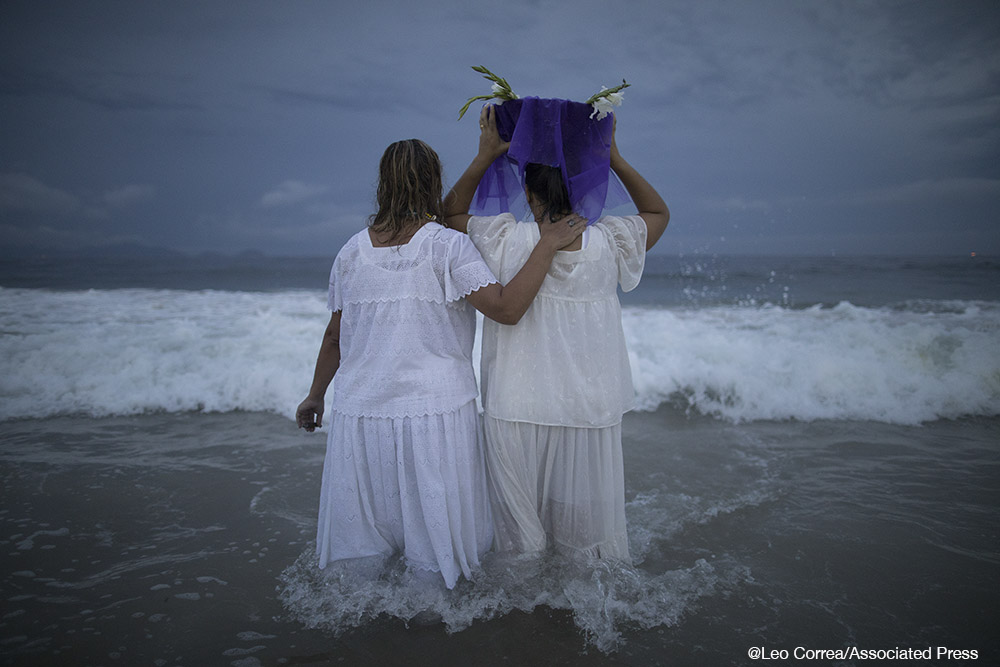
A faithful carries flowers as an offering for Yemanja, goddess of the sea, during a ceremony that is part of traditional New Year's celebrations on Copacabana beach in Rio de Janeiro, Brazil, Friday, Dec. 29, 2017. As the year winds down, Brazilian worshippers of Yemanja celebrate the deity, offering flowers and launching large and small boats into the ocean in exchange for blessings in the coming year. The belief in the goddess comes from the African Yoruban religion brought to America by West African slaves.(AP Photo/Leo Correa)

A faithful sends into the waters a small-scaled boat filled with offerings for Yemanja, goddess of the sea, during a ceremony that is part of traditional New Year's celebrations on Copacabana beach, in Rio de Janeiro, Brazil, Friday, Dec. 29, 2017. As the year winds down, Brazilian worshippers of Yemanja celebrate the deity, offering flowers and launching large and small boats into the ocean in exchange for blessings in the coming year. The belief in the goddess comes from the African Yoruban religion brought to America by West African slaves.(AP Photo/Leo Correa)
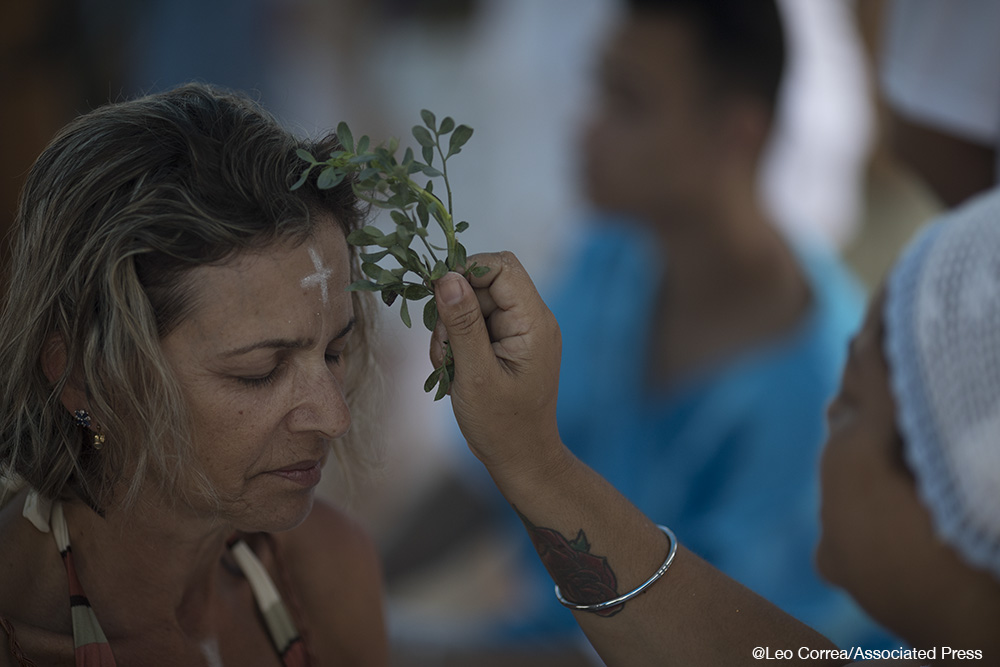
A woman is blessed during a ceremony for Yemanja, goddess of the sea, that is part of traditional New Year's celebrations on Copacabana beach in Rio de Janeiro, Brazil, Friday, Dec. 29, 2017. As the year winds down, Brazilian worshippers of Yemanja celebrate the deity, offering flowers and launching large and small boats into the ocean in exchange for blessings in the coming year. The belief in the goddess comes from the African Yoruban religion brought to America by West African slaves.(AP Photo/Leo Correa)
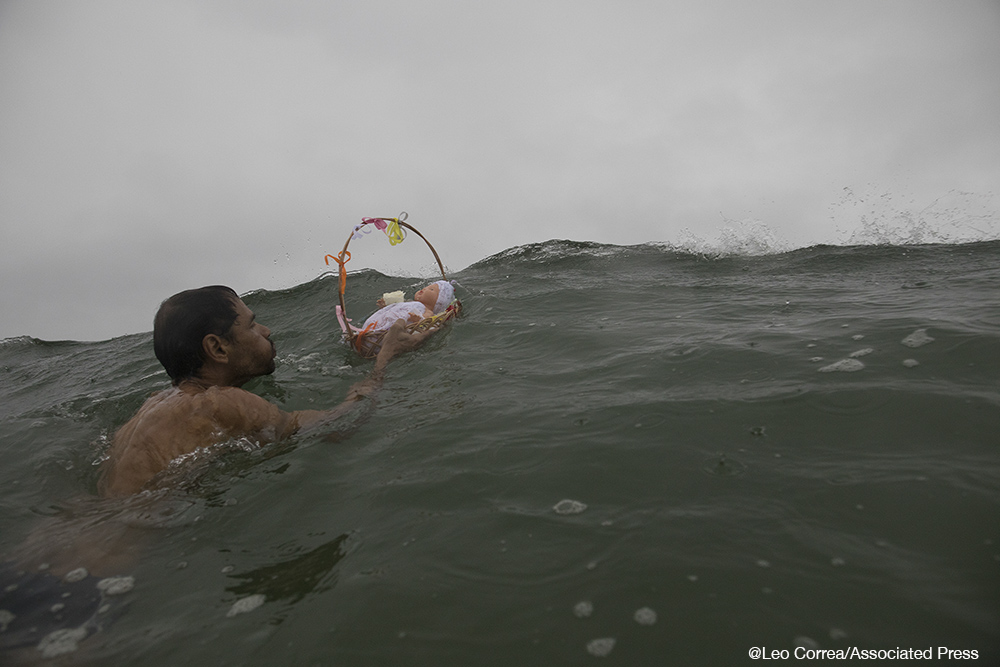
A man sends a basket with a doll into the waters of Copacabana beach as an offering for Yemanja, goddess of the sea, in Rio de Janeiro, Brazil, Friday, Dec. 29, 2017. As the year winds down, Brazilian worshippers of Yemanja celebrate the deity, offering flowers and launching large and small boats into the ocean in exchange for blessings in the coming year. The belief in the goddess comes from the African Yoruban religion brought to America by West African slaves.(AP Photo/Leo Correa)
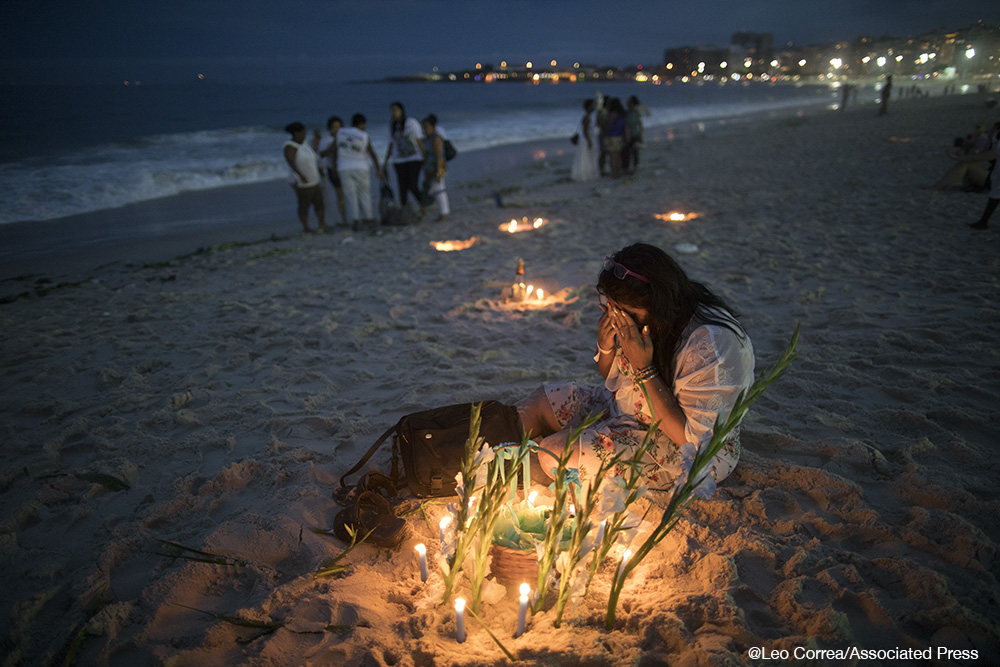
A faithful prays for Yemanja, goddess of the sea, during a ceremony that is part of traditional New Year's celebrations on Copacabana beach, in Rio de Janeiro, Brazil, Friday, Dec. 29, 2017. As the year winds down, Brazilian worshippers of Yemanja celebrate the deity, offering flowers and launching large and small boats into the ocean in exchange for blessings in the coming year. The belief in the goddess comes from the African Yoruban religion brought to America by West African slaves.(AP Photo/Leo Correa)

A woman jumps a wave as she prays to Yemanja, goddess of the sea, during New Year's Eve festivities in Rio de Janeiro, Brazil, Sunday, Dec. 31, 2017. Faithfuls believe that jumping seven waves for the goddess could bring good luck in the coming year. (AP Photo/Leo Correa)

A woman offers flowers to Yemanja, goddess of the sea, for good luck in the coming year during New Year's Eve festivities in Rio de Janeiro, Brazil, Sunday, Dec. 31, 2017. The belief in the goddess comes from the African Yoruba religion brought to America by West African slaves (AP Photo/Leo Correa)

A couple hug each other as they watch fireworks exploding over Copacabana beach during New Year's celebrations in Rio de Janeiro, Brazil, Monday, Jan. 1, 2018. (AP Photo/Leo Correa)

People watch the fireworks exploding over Copacabana beach during the New Year's celebrations in Rio de Janeiro, Brazil, Monday, Jan. 1, 2018. (AP Photo/Leo Correa)

People watch the fireworks exploding over Copacabana beach during the New Year's celebrations in Rio de Janeiro, Brazil, Monday, Jan. 1, 2018. (AP Photo/Leo Correa)



















